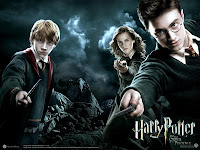Harry Potter

I know that this post is about 10 years behind the times -- which in web terms is about a century -- but I don't care. I'm going to blog about Harry Potter.
Over 10 years ago, after Harry Potter and the Philosopher's Stone came out, I remember hearing all the scuttlebutt among religious folk about how the book and the author were evil (into witchcraft and stuff). I remember walking into a "conversation" between a young second year teacher and a student. The student was telling the teacher that Harry Potter was evil because it had witches and spells in it and, as a Christian, he thought that that was bad -- especially since it was a book for kids. The teacher was explaining that you can't be so black and white about things and that you shouldn't judge.
Truth be told, I was keeping my head low, hoping to make like Harry with his invisible cloak and not be seen. No such luck. I was stopped and asked, "Hey Rocco, you're religious. What do you think of Harry Potter?"
I responded, "Well there are things that I've heard that concern me, but I'd like reserve an opinion until I've read them."
Well, 10 years later, I've read all the but the last installment. Wow. What a great storyteller. I haven't read all the controversy surrounding her. What I did glean, however, (from Wikipedia) is that she considers herself a Christian and that she belongs to the Church of Scotland. But that's neither here nor there. I'm reminded of what our University English professors told us regarding literary criticism. Whenever students would try to bring an author's biography to bear on his or her work we'd be stopped dead in our tracks. We were told that a text should stand on its own two feet; it should be judged/appraised/appreciated/understood according to the words on the page not the personality behind them.
The other classic mistake people make when dealing with literature or film is that they get caught up with the particulars of the work and miss the big picture. In movies, for example, sometimes people don't get the genre and judge film noir for being really dark. Well yeah: noir = black... In Harry Potter, it's easy for people with a religious fundamentalist bent to look at the particulars of witches, wizards and spells and miss the fact that this it is essentially a classic tale of good versus evil. It's got everything from the innocent child archetype to the mentor-pupil story to nicely structured triumvirate of friends to a powerfully memorable villain and on and on. Heck, it even has the odd biblical symbol thrown in. Why is Harry safe on Privet Drive? Because he's protected by the sacrificial blood -- he's safe in the home of the sister of his mother who died saving him. Sound familiar?
Alright then: I'm off the see The Half Blood Prince tonight. And tomorrow I'll get started on Harry Potter and the Deathly Hallows.


when they first came out, i was told that they were evil because they dealed with witchcraft - so my 11 year old brain said no chance am i reading those.
ReplyDeleteThen i found out my sister had started reading them and i was shocked - I look up to my sister for everything, and my 11 year old brain still had a 'see what you do, do what you do' thought process when it came to my sister. So I tried them, and between reading the books and talking to my sister about them, I realized what my issue was - I was mixing truth and fiction.
These books are a work of fiction, and if you know that when you start, you're not about to believe that there are special people out there who refer to us as 'muggles' and go to schools we know nothing about, live in places we've never dreamed of, and can control just about anything if they really wanted to.
I am a lover of all books - well, mostly all. I'm a bookworm to say the least. I read fantasy novels dealing with magic, and fake places with fake beings that go on grand adventures that could never happen.
Some people would say i'm reading lies. I say, i'm reading creativity - it doesn't hinder my belief in God or the realization of the world i live in, it simply takes the world we live in and imagines it from a different point of view. In the end, the stories are still about kids my age, struggling with everyday problems.
Sarah (I'm assuming you're a former student?) thanks for your comment. For those who would say that fiction readers are reading lies, I'd say they don't understand fiction. As Stephen King said, "[fiction is]truth behind the lie." Unlike non-fiction, at least fiction doesn't pretend to be "true".
ReplyDelete